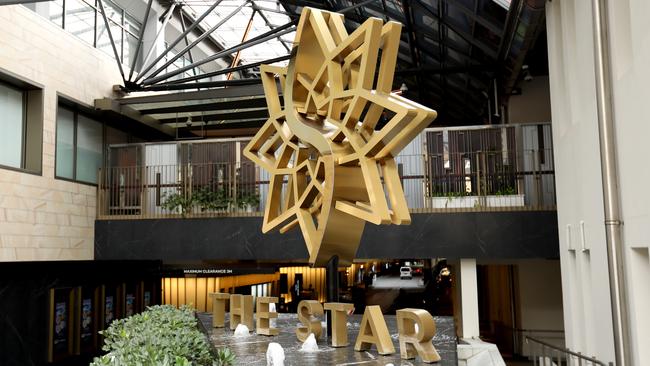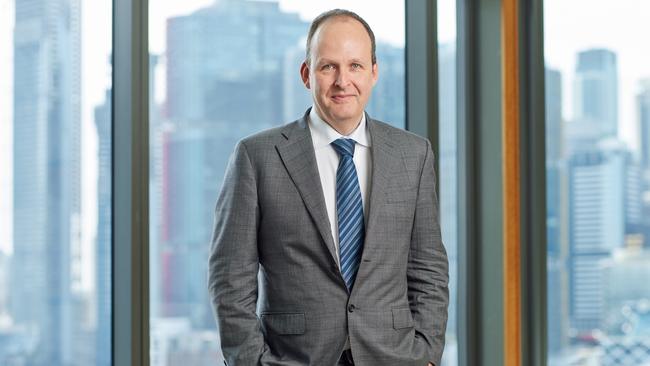Star Entertainment flags $1.6bn charge as it faces higher NSW taxes and money laundering fallout
The casino group’s shares hit a record low following its warning of a $1.6bn charge, as revenue dives at its flagship Pyrmont casino following a damning inquiry.
Star Entertainment’s shares have plunged more than 20 per cent after it warned investors of an earnings hit of up to $1.6bn, citing proposed tax hikes in NSW and increased competition from Crown Resorts.
The company’s casino in Pyrmont – which enjoyed exclusivity in Sydney before Crown’s $2.2bn Barangaroo resort opened last August – has failed to regain momentum following a damning royal commission-style inquiry.
Star said its Pyrmont revenue for half year to December dived 13.5 per cent below pre-pandemic levels, offsetting strong gains across its Queensland casinos.
The company has spent tens of millions of dollars reforming itself and has made widespread changes – including slamming the door on cashed-up but risky customers – after it was declared unfit to hold a NSW casino licence for flouting anti-money laundering laws.
But chief executive Robbie Cooke said on Monday that the NSW government’s proposed casino tax hike would hurt it the most.
Mr Cooke said the company would write-down $400m-$1.6bn on its Sydney casino when it releases its half-year accounts next week, attributing the wide range to uncertainty around NSW’s tax system.
“We are engaged in constructive discussions with the NSW Government in relation to the proposed casino duty rate changes,” he said.
“Whilst the outcome of recent regulatory and legislative developments remains uncertain, we have taken a prudent approach to assessing the carrying value of our assets, which has resulted in a non-cash impairment charge which will be recognised in our 1H FY23 results.”
Investors dumped the stock on Monday, with Star’s shares diving 20.8 per cent to $1.48 – the lowest level since it was spun out of Tabcorp 12 years ago – valuing the company at $1.4bn and potentially making it vulnerable to a takeover.
Private equity group Blackstone acquired Crown for $8.9bn last year amid increased interest in Australian gaming assets, particularly from US groups.

It comes as Star fronted the Federal Court on Monday in its first appearance in Austrac’s lawsuit against the group over “innumerable” and systemic breaches of anti-money laundering and counter-terrorism financing laws. Its barrister John Sheahan KC said it was likely that the company would make “complete admissions” based on previous cases.
“It is the goal of my client and I’m sure of Austrac to bring that outcome about,” Mr Sheahan said.
It faces fines of up to $22.5m per breach.
“We are singularly focused on working with our regulators … as we seek to return to suitability,” Mr Cooke said.
“Our key priority is to regain the trust of our community and demonstrate to our regulators that we are suitable to hold our casino licences. Aligned to that, we continue to support the NSW Premier’s initiatives around cashless gaming and improved harm minimisation across the industry.”
The state’s gaming regulator has suspended Star’s Sydney licence, following last year’s review headed by Adam Bell SC. But it has allowed the casino to operate in an effort to preserve jobs as it works to regain suitability.
Meanwhile, Star said it has been forced to pay for a “surge” in third-party consultants as it spends $20m on “remediation costs”, which are expected to increase to more than $60m by next year.
“The Star Sydney trading performance has been adversely impacted by several factors, in particular by increased operating restrictions from mid-September following the Bell Review and amendments to the NSW Casino Control Act,” the company said in an announcement to the ASX.
“This saw an increase in the number of excluded patrons and a reduced level of complimentary services and benefits in private gaming areas, impacting both slots and table games performance.”

Star said it has also suffered from increased competition following the opening of Crown Resorts’s $2.2bn casino at Barangaroo in August. This is despite Crown Sydney being able to host only table games and no gaming machines.
Morningstar analyst Angus Hewitt estimated that Star would lose about 20 per cent of its table gaming business to Crown Sydney within three years.
This compares with generating record revenue – up 30 per cent on pre-pandemic levels – at its Gold Coast casino. Meanwhile, its Brisbane casino delivered a 9 per cent increase. It comes as it has spent almost $6bn on it Queensland gaming resorts.
But its performance in Sydney dragged overall half-year revenue down 1 per cent on pre-pandemic levels.
Star said it expects to report underlying earnings before interest, tax, depreciation and amortisation of $330m to $360m this financial year, while remediation costs will jump to $35m-$45m. It predicts about half those costs will be recurring in 2024.
It said it would range from $400m to $1.6bn and is “based on the implementation of NSW casino duty rate increases as proposed by the NSW Government on December 17 2022. The low end of the range assumes no change in NSW casino duty rates”.
The Star said it intended to implement several “focused operational initiatives designed to improve its trading performance” in coming months.
This includes replacing third-party consultants with employees and “enhancing the customer experience” to respond to competition from Crown.
“These initiatives are expected to contribute only marginally in the last quarter of the FY23 period, and no impact is assumed in the above guidance for FY23. On an annualised basis, these initiatives are estimated to contribute in the order of $40 million to the Group’s operating performance.”








To join the conversation, please log in. Don't have an account? Register
Join the conversation, you are commenting as Logout